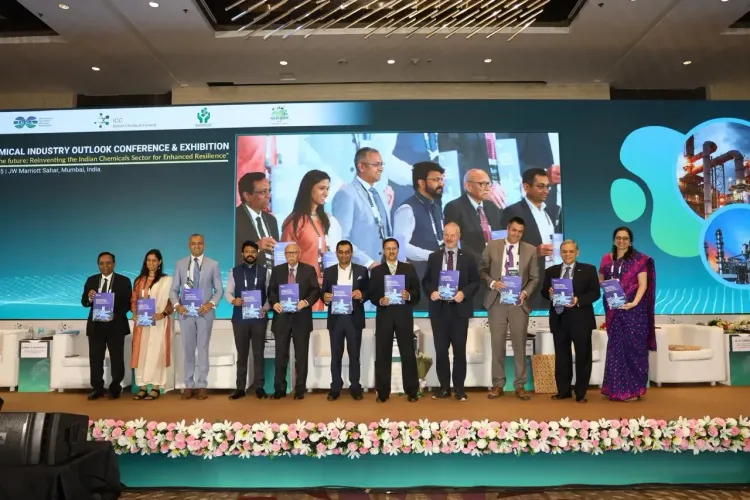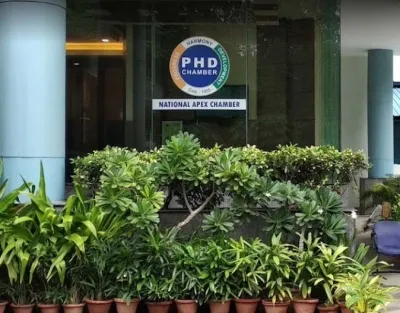India's Chemical Sector Aims for $1 Trillion by 2040

Synopsis
Key Takeaways
- Targeting $1 trillion turnover by 2040.
- Focus on innovation, AI, and sustainability.
- Government support and technological advancements driving growth.
- Increased investments and integration in global value chains.
- India's chemical exports contribute significantly to the economy.
Mumbai, March 4 (NationPress) The Indian chemical industry is setting its sights on becoming a global leader, aiming to surpass the $1 trillion milestone by 2040 through innovation, AI, and sustainability. The Indian Chemical Council (ICC), the premier national organization of the Indian chemical sector, organized the 18th annual India Chemical Industry Outlook conference and exhibition with the theme "Engineering the Future: Reinventing the India Chemicals Sector for Enhanced Resilience".
This event serves as a vital platform for policymakers, industry leaders, and investors as India's $220 billion chemical sector prepares to exceed $1 trillion by 2040, solidifying the nation's status as a global chemical powerhouse.
A white paper from McKinsey & Company, entitled 'Building Resilience for Global Leadership: The Path Forward for India’s Chemicals Industry', was introduced during the conference. The document outlines a new era for the global chemicals industry, explores the potential for substantial growth and resilience within India’s chemical sector, and proposes a forward path for Indian chemical enterprises.
ICC President and SRF Ltd's Joint Managing Director Kartik Bharat Ram addressed a gathering of over 700 attendees. In his keynote speech, he stated: "With increasing domestic demand, changing supply chains, and competitive pricing, the sector is on the brink of remarkable expansion."
He added, "Support from the government and advancements in technology are further propelling this progress. Representing over 80% of the industry, ICC was honored with the prestigious 2024 OPCW Hague Award for its dedication to chemical safety and security. Our next objective must be to establish India as a global leader in chemicals."
The Secretary of the Department of Chemicals & Petrochemicals, Nivedita Shukla Verma, participated virtually as the Chief Guest, stressing the importance of the theme in light of the dynamic geopolitical context and India's vision for Viksit Bharat 2047.
She underscored the necessity for increased investments, R&D, and global value chain integration, announcing the sanctioning of five new Centres of Excellence, with plans for three additional centers. A dedicated portal now links 1,000 industries with 50 research institutions, promoting collaboration between industry and academia.
Joint Secretary of the Department of Chemicals & Petrochemicals, Deepankar Aron, delivered a keynote address that focused on the influence of global geopolitical changes and the pressing need for technological reinvention in the chemical industry.
He asserted that realizing Viksit Bharat 2047, as envisioned by the Prime Minister, necessitates rapid economic growth—targeting a $26 trillion economy and a per capita income exceeding $14,000.
With chemical exports accounting for 7% of India’s merchandise exports ($45 billion last year) and FDI inflows approaching $20 billion over two decades, the sector remains a crucial driver of growth.
Marco Mensink, Director General of the Brussels-based European Chemical Industry Council (CEFIC), discussed the geopolitical developments and the emerging opportunities for India’s chemical sector.
The conference concentrated on growth, market expansion, and the effects of AI, technological advancements, and sustainability on India's chemical industry. The 18th ICC Conference delved into digital transformation, AI integration, and sustainability-focused innovations. Experts presented case studies on net-zero initiatives, including carbon capture, process automation, and sustainable feedstocks. The importance of hydrogen-based production in minimizing carbon footprints and government-backed R&D incentives for energy-efficient methods was also emphasized.
India is rising as a leader in environmentally friendly specialty chemicals amid a global shift towards climate-aware production. With increasing investments in blockchain-enhanced supply chains, AI-centered quality control, and smart manufacturing, the industry is experiencing a technology-driven transformation that is shaping its long-term competitiveness, according to the ICC statement.








